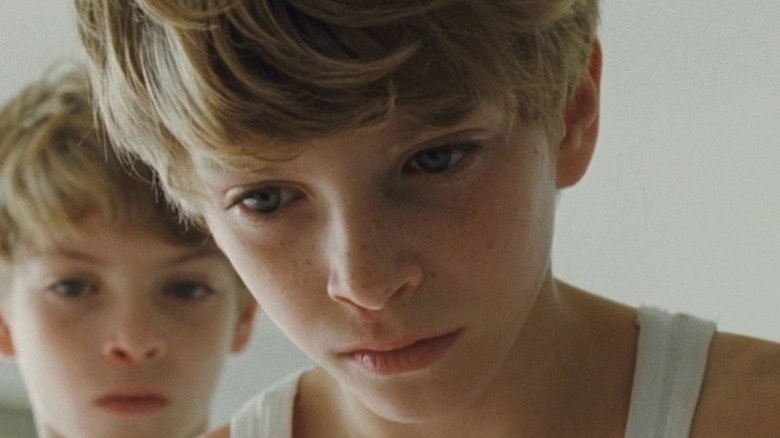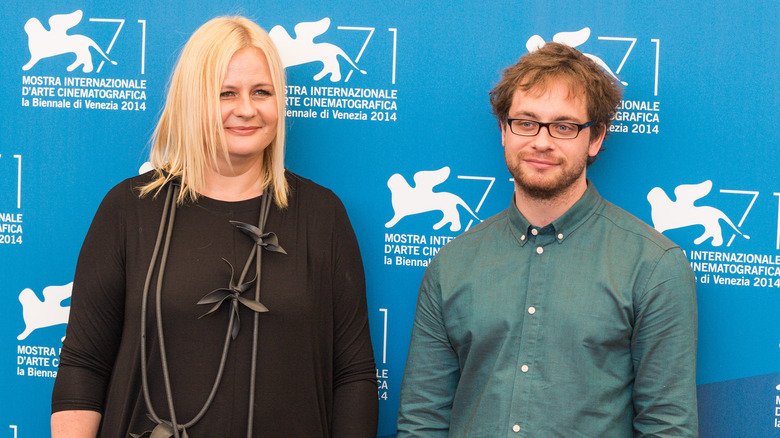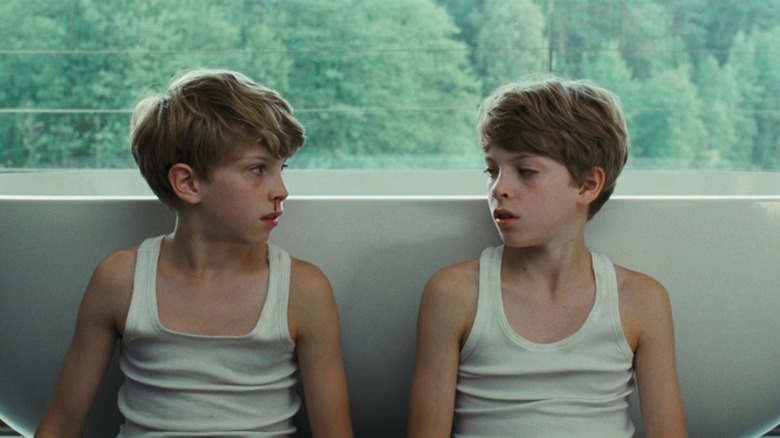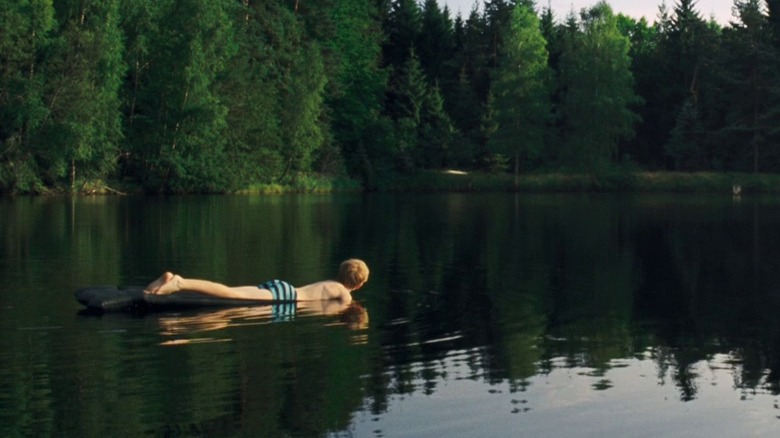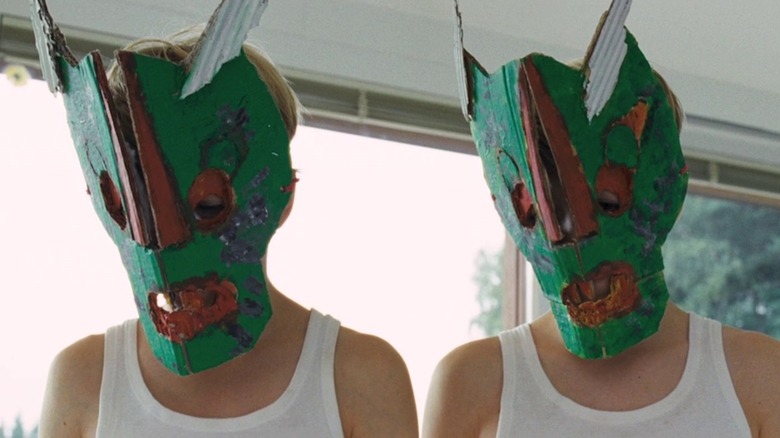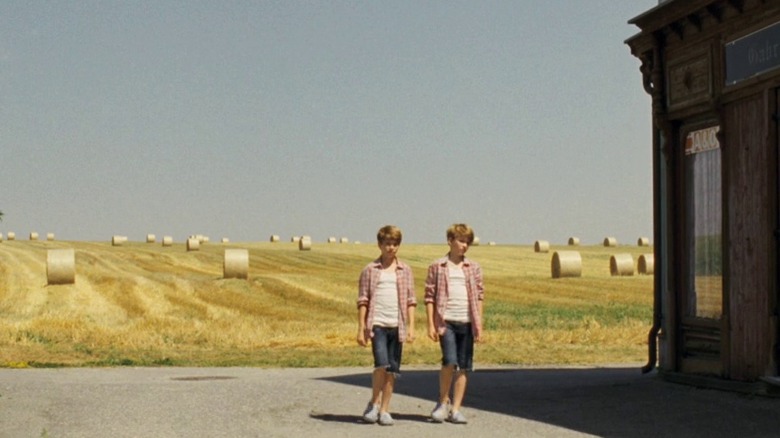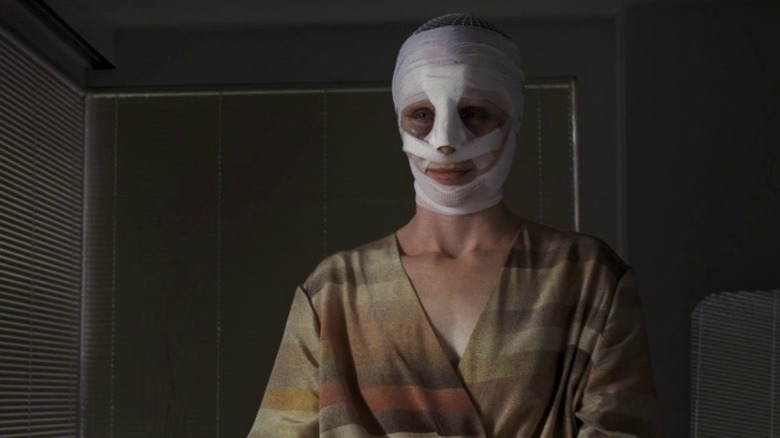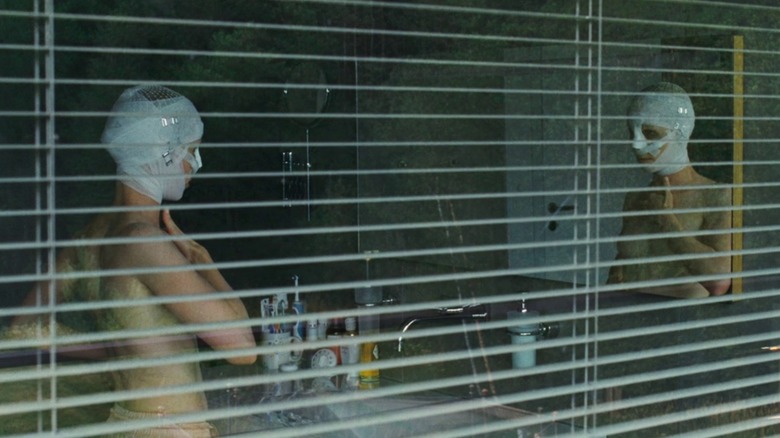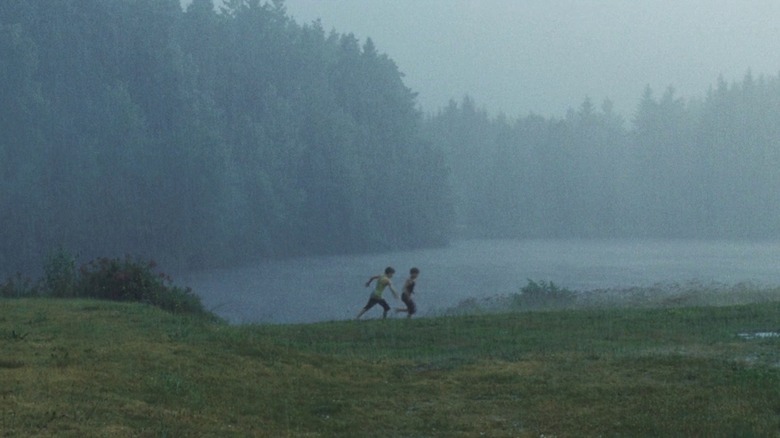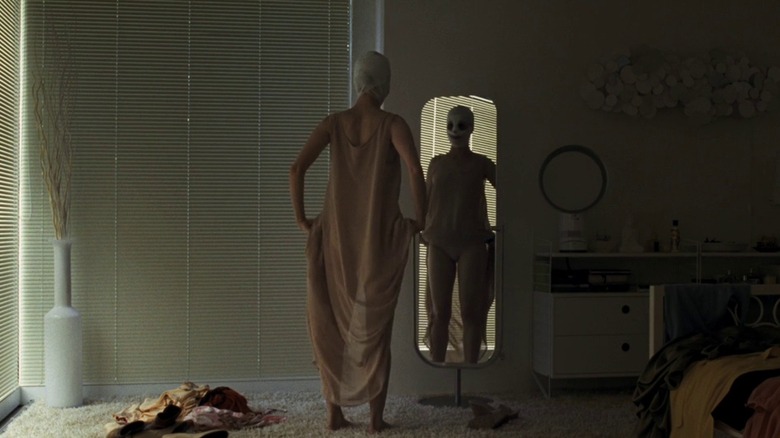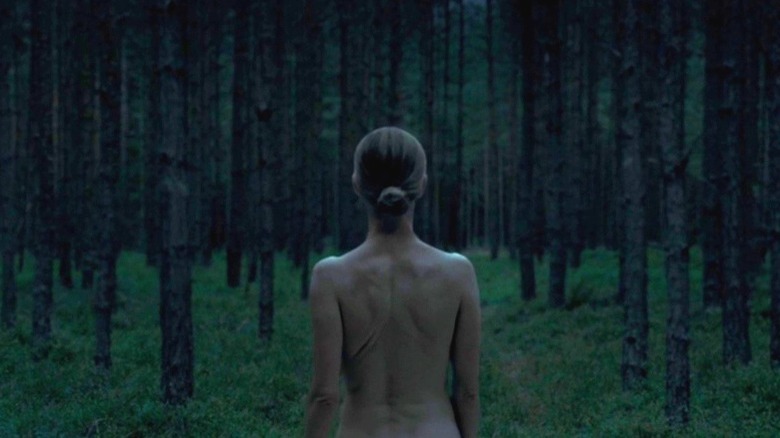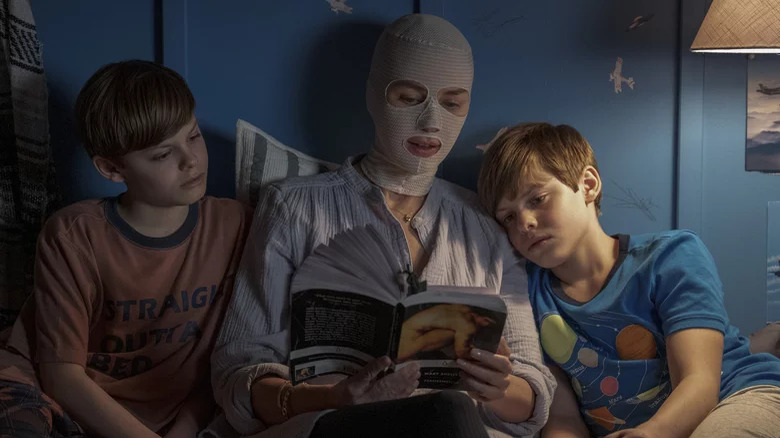Goodnight Mommy: Hauntingly Good Facts Fans Will Eat Up
Nobody in Austria could have predicted how well-received the 2014 psychological horror "Goodnight Mommy" would be. "In Austria, there isn't much of a horror film tradition," revealed Veronika Franz to Vice, half of the flick's directing duo, adding that people in her native country weren't really interested in it before it received international acclaim. Released as the first feature film by Franz and Severin Fiala, "Goodnight Mommy" is an unsettling ride, complete with various red herrings and gorgeous cinematography, which will undoubtedly stick with viewers well after the credits roll. So successful was the film, in fact, it spawned a 2022 American remake of the same name, released on Amazon Prime Video.
"Goodnight Mommy" follows two twin brothers, Elias (Elias Schwarz) and Lukas (Lukas Schwarz), who one day welcome their mother (Susanne Wuest) home from a medical procedure. The catch? Her face is horrifyingly wrapped in bandages, leading the boys to wonder if it's truly their beloved mom. Their house, an ultra-modern and minimalistic home isolated near a lake, adds to the creepy atmosphere.
According to Vice, buzz began circulating in Austria after the film was released in the U.S., leading the country to submit "Goodnight Mommy" as a candidate for the 88th Academy Awards. Although the flick is a horror movie at its surface, it's also a very clever and layered watch, filled with metaphors for trauma and identity. Let's dive into these themes and more with some wickedly fascinating facts about "Goodnight Mommy."
The directors are actually an aunt and nephew duo
"Goodnight Mommy" was written and directed by Veronika Franz and Severin Fiala, who are, interestingly enough, an aunt and nephew duo. As they both revealed in a chat with Anthem in 2020, their mutual obsession with movies started when Fiala was around 13, and he would go and babysit Franz's children and watch movies after he put them to sleep. Whenever Franz would come home, she'd ask him what he was watching. "We found out that, even though there's a huge age difference, we kind of liked the same films and felt the same towards them," shared Fiala, adding that they then started to watch movies together.
Franz, on the other hand, became a film journalist and then turned to screenwriting after 10 years. She also helped out her ex-husband, who worked in the industry. Fiala eventually attended film school, and during this time, the family members kept watching movies and further developed ideas of what they both liked. "We trust each other," Fiala declared to RogerEbert.com.
Their joint debut film was a documentary, 2012's "Kern," which was apparently not well-received. "It's the least successful Austrian film ever," recalled Fiala to ScreenAnarchy. And yet, some good came out of the time spent shooting "Kern." It's actually during this time that Fiala and Franz wrote the script for "Goodnight Mommy," more so as a distraction from the intensity of their doc. "Once we had written it down we said, 'Why not make it?'" Fiala told Anthem. The rest, as they say, was history.
The casting process for Elias and Lukas was grueling
"Goodnight Mommy" focuses on two leads, Elias and Lukas, played by real-life brothers Elias and Lukas Schwarz. Finding the two twins definitely took some work. According to directors Veronika Franz and Severin Fiala, they auditioned 130 pairs of twins in Austria, an already relatively small country with a population of around 9 million people. "We would call schools and they would know if there were twins that age," explained Fiala to RogerEbert.com, adding, "We had a lot of twin pairs to look at." Then, when auditioning the children, Fiala and Franz initially wanted to play games with them, such as "I Spy" or "Rock Paper Scissors." As the duo revealed, though, this didn't seem to help them out much, as twins will reportedly always pick the same item.
So, why did the filmmakers choose the Schwarz twins? "[They] were the most courageous ones," recalled Franz, explaining that another part of the audition involved tying Susanne Wuest — who plays the mother — to a chair (via RogerEbert.com). The filmmakers then told them that Wuest kidnapped their mom, so they had to figure out what happened to her — by whatever means necessary. While many of the children auditioning were hesitant, the Schwarz twins grabbed a pencil and began to poke the actress' arm.
Although the Schwarz brothers are hard to tell apart in "Goodnight Mommy," Fiala told ScreenAnarchy that they actually aren't identical, but that didn't stop the directors from having trouble distinguishing the two. It turns out they weren't the only ones who struggled, either; the job of the continuity person proved to be a challenge, too.
It's a commentary on trauma and loss
Sure, "Goodnight Mommy" is an unsettling and genuinely creepy film, but it carries a lot of weight behind some of its most macabre moments. Without spoiling too much, in the final act, where audiences finally realize the brutal truth behind what truly happened to the twins, the entire flick comes together as a metaphor for dealing with trauma and loss. What's more, Lukas and Elias' father is never brought up in the movie, so viewers never know what happened to their paternal figure, either.
As "Goodnight Mommy: Radical Loss and Desperate Measures" notes, there's a reason why the mother character is distant towards Lukas and responds angrily toward Elias, her eyes bloodshot and wet through her terrifying bandages. Further, she implements rules after she comes home from her surgery, demanding a quiet space and choosing to, instead, spend her days alone in her bedroom. "'Goodnight Mommy' [is an] example of a mother responding too late to prevent a traumatic loss," explains "Post-Horror: Art, Genre and Cultural Elevation."
Of course, filmmakers Veronika Franz and Severin Fiala did a hefty amount of research prior to making the film, telling Vice, "We talked to a lot of children's psychiatrists. They said they had seen things that were worse."
The usage of masks throughout Goodnight Mommy
A consistent visual throughout "Goodnight Mommy" is the usage of masks. Of course, the titular "mommy" wears a frightening mask of bandages that wraps around her entire face, while her two boys also wear somewhat menacing green masks while playing together. Naturally, this usage of masks means something; specifically, they're supposed to signify one's identity.
"We think that you have several identities. You are different depending on different circumstances. That's what we tried to play through with all of those images," explained director Veronika Franz to RogerEbert.com. Filmmaker Severin Fiala further elaborated on this concept while speaking to Interview, noting that it's often difficult for children to visualize what a person could be like outside of regular circumstances. "They only see this perfect image of the perfect mother, and when something changes in that image, that really can shape the bond between them," he explained.
Susanne Wuest, who plays the twins' mother in the horror flick, cleverly compared the movie's premise in modern terms that will almost certainly resonate with audiences, telling DuJour that every day people will present themselves a certain way on the internet — an identity (or mask) that may not be the same representation of who they are in real life.
The agonizing silence in Goodnight Mommy proved effective
One interesting aspect of "Goodnight Mommy" that audiences may notice is that it's an incredibly quiet film devoid of much dialogue. Of course, this is immediately displayed in our characters' isolating house — an elegant yet cold and concrete modern home. Furthermore, when the mother comes home from her surgery, she instructs her children not to make much noise (not that they do, anyway, as noted in the outdoor scenes when the twins are playing together).
The silence only adds to the unsettling nature of "Goodnight Mommy," where viewers pay attention to every footstep, anxiously waiting for a typical horror movie jump-scare at any given moment. "[We wanted] to make a nearly-silent film, a film in which no one talks, a film that tells its story in pictures," filmmaker Severin Fiala told RogerEbert.com. "That's what cinema can do, and should do. We only used dialogue when we couldn't think of any solution to lose it."
In an interview with AwardsDaily, Fiala and Veronika Franz revealed that it was actually the flick's composer, Olga Neuwirth, who suggested the movie use minimal music. She initially wrote a lot more of the flick's music, which made it hard for the directing duo to cut and strike a balance to maintain the movie's unnerving atmosphere. The payoff is evident. During one scene, where members of the Red Cross come knocking at the door, the following (rather normal) back-and-forth ensues seems downright bizarre.
Goodnight Mommy was shot in chronological order
The performances of the two lead brothers (Elias and Lukas Schwarz) in "Goodnight Mommy" seem incredibly genuine and deliberate — quite the feat for two child stars in their debut movie roles. One aspect that may have contributed to their acting prowess is that directors Veronika Franz and Severin Fiala decided to shoot "Goodnight Mommy" in chronological order without much of a script.
"They didn't know what was going to happen. Every day, they were excited to find out the story," recalled Susanne Wuest, who plays the boys' mother, to DuJour, adding, "It was mostly improvised." The filmmakers elaborated more on this concept while speaking to ScreenAnarchy, admitting that in the beginning, it was a bit difficult to guide the young stars in this environment without much direction. "The first thing we had to do was to tell the children that they don't need to know everything," explained Fiala. So, with a rough script, as they were shooting, Franz and Fiala merely gave the Schwarz twins a vague description of what they wanted them to do.
The result, of course, proved to be incredibly effective. One example is when the brothers see Wuest for the first time. As detailed in a chat with Interview magazine, the directors kept a wrapped-up Wuest hidden from the children, so in the scene where she returns from the hospital for the first time, her face covered in bandages, their look of shock is, without a doubt, totally authentic.
Susanne Wuest found shooting Goodnight Mommy to be quite intense
Shooting "Goodnight Mommy" was a unique experience, primarily because filmmakers Severin Fiala and Veronika Franz aimed to make the three months of shooting time as authentic and psychologically grueling as possible. Speaking with DuJour, the titular mommy, Susanne Wuest, elaborated on her time on set, revealing that the Austrian village they shot in, Haugschlag, was incredibly isolated, without any phone service or internet.
Although Wuest did enjoy shutting off from the technological world, she doesn't deny the demanding daily process of wrapping her face up in bandages, a task that took an hour and a half to put on and take off. Noting that her balance was thrown off and she had difficulty walking while in costume, the actress further explained to DuJour, "Beneath the bandage, my head was boiling at times. Sometimes I felt like someone who was under heavy medication — I couldn't see, smell, had a hard time hearing and talking."
But it wasn't just the taxing nature of her costume that was mentally (and physically) exhausting, as the star also had to deal with real cockroaches coming out of her mouth for one particular scene. While many actresses would be squeamish even at the thought, Wuest decided to bond with the creepy critters instead. "I asked the production company if I could have some of these roaches right from their birth. I grew quite fond of them," she mused, adding that she even named them. For what it's worth, Wuest is a highly-acclaimed star in her native Austria, with the publication Filmdienst praising the courageous roles she takes and comparing her to the award-winning powerhouse Tilda Swinton (via SusanneWuest.com).
It was entirely shot on 35-millimeter film
Something viewers will immediately notice while watching "Goodnight Mommy" is its gorgeous cinematography. Shot by Martin Gschlacht, the result is undeniably beautiful — save for the grotesque scenes that remind audiences that they are, in fact, watching a horror film. As directors Severin Fiala and Veronika Franz explained to ScreenAnarchy, they were insistent on shooting on 35-millimeter film, even if it was their first feature film.
"It was the question of money and time and many suggested us shooting in digital since we are first time directors — too much film stock, especially shooting with children and so on," clarified Fiala to ScreenAnarchy, noting that it was actually the flick's producer, Ulrich Seidl, who helped push the directors away from filming on digital. So, why did Franz and Fiala desperately want to use film stock? According to a statement by the filmmakers on the European Film Awards' website, the reasoning was simple: it simply looked eerier. "For us a face on 35mm simply has more mystery about it," the duo declared.
At the end of "Goodnight Mommy," as the credits roll, the words "gloriously shot on 35 mm," appear on the screen and there's no denying that the visuals are, indeed, a glorious (and sometimes horrifying) sight to behold.
Goodnight Mommy was inspired by a German reality TV series
"Goodnight Mommy" is inspired by something none of its fans would have guessed: reality television. Elaborating on this bizarre concept during a chat with Fangoria, director Veronika Franz explained that she and Severin Fiala got the idea for the flick's concept while watching a German reality series one day, which sees middle-aged women go under the knife for various beauty operations.
"They get their hair done, their teeth, their cheekbones, and after two months they look completely different," detailed Franz, revealing that in the end, the women are finally brought back to their families. "With the children, it kind of appeared to us that it was not pure joy on their faces the first time they looked at their mother; it was like irritation, because they hardly recognized her," recalled the filmmaker, describing one daughter that frantically tugged at her father's arm and declared, "It's not our mother!" As Fiala added, the idea for "Goodnight Mommy" developed from there, with the two directors exploring the concept of a child's doubt only growing out of their terror.
Interestingly enough, Franz and Fiala claim they never intended to make a horror film, yet after fleshing out the characters, the genre simply picked itself.
The directors were inspired by Francis Bacon's paintings
One particularly creepy scene in "Goodnight Mommy" is sure to unsettle audiences. The camera slowly pans through a foggy forest, and the mother character walks through it, nude and slowly taking off her bandages. As the scene focuses on her head, it suddenly starts to shake violently and is completely unrecognizable to the viewer.
It turns out filmmakers Veronika Franz and Severin Fiala were heavily inspired by Francis Bacon for this scene, an artist known for his grotesque portraits that sees his subjects in complete agony. "He's a master of painting fear, of painting people who are imprisoned in their own body and trying to break out," explained Fiala and Franz to TalkHouse, praising Bacon's artistry.
Citing the specific forest scene, the pair elaborated that the Irish painter directly influenced all those visuals. "You don't see the person's face, yet it reveals something much deeper about their fears and inner state," the filmmakers noted (via TalkHouse).
Goodnight Mommy was remade in 2022
In April 2021, Variety announced that the original "Goodnight Mommy" would be given the remake treatment, directed by Matt Sobel and starring Naomi Watts as the titular "Mommy." In a statement published by the outlet, Sobel declared, "In our reimagining of 'Goodnight Mommy,' fear of abandonment — and the dreadful realization that those close to us may not be who they seem — create an immersive nightmare."
Amazon Studios released the English-language version of "Goodnight Mommy" in September 2022 to less-than-stellar reviews. As Mashable writes, where the original Mommy, played by Susanne Wuest, is frigid and distant, Watts' version is much more warm, still portraying a motherly sort of love to her two boys (Cameron and Nicholas Crovetti). In fact, when the twins ask her if she's really their mom, she immediately attempts to clear up any doubts. This moment, notes Polygon, which happens early on, is crucial to the flick's demise, as it gets rid of that ever-present unsettling horror that the Austrian original so masterfully showcases.
Another significant difference, according to Polygon, is that where the original focuses on silence throughout the movie, Sobel's interpretation has the two boys talking much more. As the website explains, this "[voids] any sense of tension or ambiguity throughout the film."
